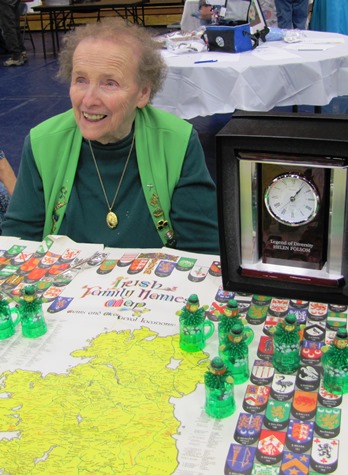Views West
by Murrel Bland
The Boss Lady (Carol) and I walked into the Standees movie theater Saturday, March 15, to watch the independent “Jayhawkers” film. The theater and an ancillary restaurant are in the Prairie Village Shopping Center.
As we walked up to the ticket counter, we visited very briefly with three other couples—also obviously Jayhawk fans.
“Well, we don’t have to watch the Jayhawks tonight, so we came to see the movie,” one man said. KU lost the night before in the Big 12 tournament to Iowa State.
The feature film “Jayhawkers” tells the story of how Wilt Chamberlain was recruited and played basketball at the University Kansas in Lawrence. But it is much more than a film about basketball. It is a story about how the greatest basketball player ever helped change the hearts and minds of Kansans when it came to race relations.
The film tells of Wilton Norman Chamberlain who was born in 1936 in Philadelphia, Pa. He led his Overbook High School basketball team to two city championships; once he scored 90 points in a single game.
B.H. Born, a KU graduate who played for coach Phog Allen in the early 1950s, had spotted Chamberlain and encouraged Allen to recruit him. Allen visited Chamberlain and his parents and found that more than 200 other schools were recruiting the basketball sensation; Allen, known not only for his coaching skills but also for his power of persuasion, convinced Wilt to visit Lawrence.
A special delegation welcomed Chamberlain to Lawrence, meeting him at the Lawrence Airport. He decided to play for KU.
However, after he came to Lawrence, Chamberlain ran into ugly racial discrimination. Black persons were not allowed to attend downtown Lawrence movie theaters or eat in restaurants. There are scenes where Chamberlain integrates a movie theater and a restaurant.
Franklin Murphy, the KU chancellor, saw Chamberlain not only as a great basketball player, but also as an agent of change who had—through sports– the power to lead the way toward racial justice.
I recall conversations with Roy Edwards Jr. and his wife Joan, about how they befriended Chamberlain, inviting him to their Kansas City, Kan., home for Sunday dinner, despite certain neighbors who looked disapprovingly. Chamberlain would lift the Edwards children up to a goal so they could dunk the basketball.
Justin Wesley, a current member of the KU basketball team, does an excellent job of portraying Chamberlain. His coach, Bill Self, had suggested to Kevin Willmott, the film’s director, that Wesley would do a good job in the movie. Wesley did.
Willmott , a native of Junction City, Kan., is an independent moviemaker and an associate professor of film at KU. His other films include “CSA,” a story of what it would be like if the South would have won the Civil War and “The Only Good Indian,” a story about students who escape from Indian schools.
Jayhawkers” also provides insight into the life of coach Allen. Allen, portrayed by Kip Niven, played in the early 1900s for James Naismith, the man who invented the game of basketball and KU’s first head basketball coach.
Allen told Naismith that he wanted to coach basketball. Naismith said basketball didn’t really need a coach—that “you just let players play.”
According to legend, there were times during Naismith’s coaching tenure that he didn’t attend games; at other times, he served as a referee. Coaching was a sideline for Naismith—his other duties included teaching hygiene classes and conducting chapel meetings; he also was an ordained Presbyterian clergyman.
Allen was considered the man who invented basketball coaching. He wanted to coach Chamberlain; however state law forced him to retire at age 70. He was bitter that Chancellor Murphy refused to seek an exemption; instead Murphy appointed Dick Harp, Allen’s assistant, as the new head coach. Allen had favored Ralph Miller who had played at KU for Allen in the late 1930s. Miller was a very successful basketball coach at Wichita University, the University of Iowa and Oregon State.
Kathleen Warfel, an actress that I first met when she was at Washington High School in the early 1970s, does an excellent job of portraying Bess, Phog Allen’s wife. Warfel has appeared in several local theater productions and is a KU graduate.
The “Jayhawkers“ film is in black and white–consistent with the films of the 1950s era—except for the final scenes that are in color. The movie closes with shots from a halftime ceremony in early 1998 during halftime of a KU-K-State game when Chamberlain’s jersey was retired. I was fortunate to have attended that game.
Chamberlain had been reluctant to come back to KU for the ceremony; when he started to speak to the packed field house of more than 16,000 loyal Jayhawk fans, he started to apologize for losing the national championship game in 1957 to the University of North Carolina. But the fans didn’t want to hear that. There was no need for him apologize. And in that moment, he praised his KU experience, ending with ”Rock Chalk Jayhawk.”
Murrel Bland is the former editor of The Wyandotte West and The Piper Press.

